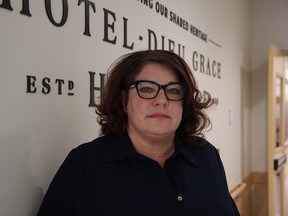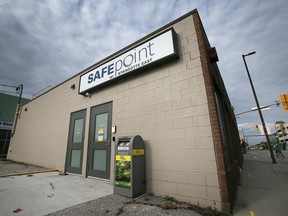

Article content
A multimillion-dollar commitment by the province towards a new Homelessness and Addiction Recovery Treatment (HART) hub will provide essential support to Windsor-Essex’s most vulnerable residents, advocates say.
Part of Ontario’s $529-million investment in addiction and mental health services, the initiative comes alongside a ban on drug injection sites within 200 metres of schools and licensed child care centres.
Advertisement 2
Article content
“It’s not going to end the homelessness and addictions crisis that we’re in, but the investment is certainly going to enhance access to services to meet the complex needs of individuals,” said Tammy Kotyk, vice-president of mental health and addictions at Hotel-Dieu Grace Healthcare.
Hotel-Dieu will co-lead Windsor’s hub in partnership with House of Sophrosyne and the Windsor-Essex Community Health Centre. It will be one of 18 across Ontario that Deputy Premier and Minister of Health Sylvia Jones announced on Monday, a day before Premier Doug Ford called a provincial election.
The local hub will provide primary care, mental health services, addiction support, social services, transition beds, supportive housing, and other essential services. The province will provide $6.3 million annually for three years to fund the hub, Kotyk told the Star.
“Windsor’s proposal really did speak to the community’s desire to bring something such as this to the Windsor-Essex area,” said Kotyk. The timeline provides an opportunity to collect data, carry out research and measure its success, she added.
Advertisement 3
Article content
“This isn’t just about numbers and volumes of people that we’re putting through a program, we want to see those long-term outcomes of people coming through the HART hub.”
Speaking to reporter’s Monday, Windsor Mayor Drew Dilkens welcomed the announcement, noting the investment will “almost immediately” support more people in need.
“The best part about it is it’s operating dollars. They (the province) want those operating dollars in use Q1 (first quarter) of 2025 to make sure that we’re activating space that is already available.
“Think of House of Sophrosyne, places like Brentwood, who have beds that aren’t funded. Now, those beds can be funded … some of them anyway.”
This week’s announcement follows restrictions the Ford government announced on supervised consumption sites in August that dashed any hopes for the city’s SafePoint Consumption and Treatment Service site to reopen.
While supportive of the new funding, Michael Brennan, executive director of Positive Pathways, expressed concerns about the effectiveness of the HART hub model given its lack of evidence-based success.
Advertisement 4
Article content
The effectiveness of SafePoint’s consumption and treatment model, however, has “substantial evidence” that has been identified by the Auditor General, Ontario’s Chief Medical Officer of Health and other professional health agencies, said Brennan.
“The conflicting application processes for both models highlight the provincial government’s arbitrary approach to regional health matters, which can be frustrating for any community planning response, especially for those focused on reducing toxic drug poisoning and reversing the overdose epidemic in our region,” Brennan said in a statement to the Star.

The Windsor-Essex County Health Unit opened the downtown SafePoint in April 2023 under the expectation that provincial funding would kick in once Windsor’s application was formally approved.
A provincewide review of CTS sites launched after a fatal shooting outside a Toronto location in August of 2023 put all new applications on hold, including Windsor’s.
The health unit had been awaiting provincial approval for SafePoint for over two years since submitting an application to the Ministry of Health in July 2022. When temporary funding from the local health unit ran out, the site was forced to shutter Jan. 1, 2024.
Advertisement 5
Article content
Recommended from Editorial
-

Windsor’s SafePoint application denied one day after province changes rules for drug consumption sites
-

‘People will die’ — Province’s controversial move to restrict supervised consumption sites means Windsor’s SafePoint will not reopen
During its eight months in operation, SafePoint saw over 1,200 visits from 249 people, reversed five on-site overdoses, and made 237 referrals to mental health and addiction treatment. The health unit ended its tenancy in the building late last year.
“Pozitive Pathways remains committed to preventing bloodborne infections and promoting a comprehensive community overdose response that engages with individuals who use substances to foster trust and relationship building,” Brennan said.
“We will continue to work with the service providers of the HART hub model to support an individual’s journey through the care continuum and to advocate for comprehensive support and services that truly meet the individual where they are.”
Windsor’s Homelessness and Addiction Recovery Treatment hub is expected to be operational by April 1.
— With files from Taylor Campbell
Article content
link




